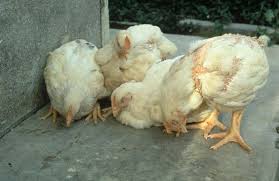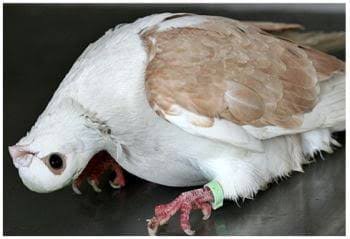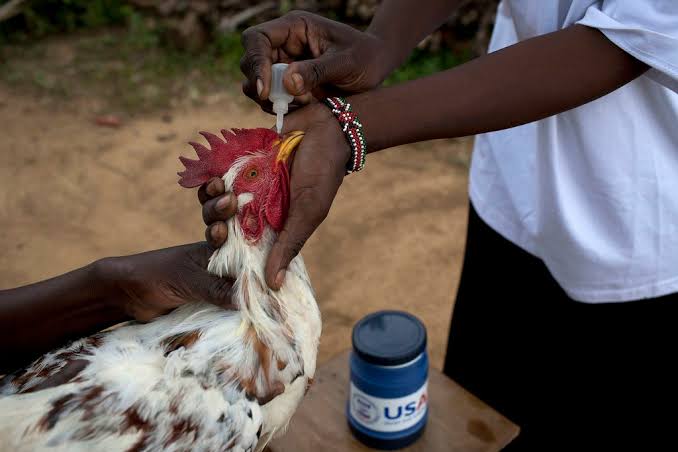Newcastle Disease (ND), scientifically known as Avian Paramyxovirus Type 1 (APMV-1), is a highly contagious viral infection that primarily affects birds. This disease is particularly devastating for poultry, including chickens and other domestic fowl, as well as wild birds.
The virus responsible for Newcastle Disease belongs to the Paramyxoviridae family and is characterized by its ability to cause severe respiratory, nervous, and digestive system disorders in infected birds. ND can spread rapidly through direct contact with infected birds, as well as through contaminated feed, water, equipment, and even airborne particles.
Affected birds may exhibit a range of clinical signs, including respiratory distress, nasal discharge, coughing, and a drop in egg production for laying hens. In severe cases, Newcastle Disease can lead to high mortality rates in infected poultry flocks, posing a significant threat to the poultry industry worldwide.
It’s important to note that Newcastle Disease doesn’t only impact poultry; wild birds, such as pigeons and doves, can also act as carriers, contributing to the spread of the virus. This makes control and prevention measures crucial for maintaining the health of both domestic and wild bird populations.
Vaccination is a key tool in preventing Newcastle Disease outbreaks. Poultry farmers often implement routine vaccination programs to protect their flocks from the virus. Additionally, biosecurity measures, such as proper hygiene practices, quarantine protocols, and limiting exposure to wild birds, play a crucial role in minimizing the risk of ND transmission.
The global impact of Newcastle Disease extends beyond the direct consequences on bird health. Outbreaks can lead to economic losses for poultry farmers, affecting livelihoods and food security in regions heavily reliant on poultry production. International cooperation and coordinated efforts are essential for controlling the spread of Newcastle Disease and minimizing its impact on the poultry industry.
Newcastle Disease, scientifically referred to as Avian Paramyxovirus Type 1 (APMV-1), poses a significant threat to both domestic and wild bird populations. Its highly contagious nature and potential for severe clinical manifestations highlight the importance of effective vaccination and biosecurity measures in preventing and controlling outbreaks. Addressing Newcastle Disease not only safeguards the health of poultry but also plays a crucial role in sustaining the livelihoods of those involved in the poultry industry worldwide.
Read Also: Sheep and Goat Housing Complete Guide
Animals Affected by Newcastle disease (Avian Paramyxovirus)

Newcastle Disease (ND) primarily affects birds, both domestic and wild. Poultry species are particularly susceptible, including chickens, ducks, turkeys, and other domestic fowl. Among poultry, laying hens and broilers are commonly affected, with symptoms ranging from respiratory distress to a decline in egg production.
In addition to domestic birds, Newcastle Disease can impact various wild bird species. Pigeons and doves, in particular, can act as carriers of the virus, contributing to its spread in both urban and natural environments. Wild birds may not show severe clinical signs but can serve as reservoirs for the virus, posing a risk to nearby poultry populations.
It’s important to note that Newcastle Disease has been reported in a wide range of bird species, including those kept in captivity, such as pet birds and exotic fowl. The virus can also affect birds of prey, making it a concern for avian conservation efforts.
While Newcastle Disease primarily targets birds, it is not known to infect mammals, including humans. However, the economic impact of ND on poultry industries, coupled with its potential to spread through wild bird populations, underscores the importance of comprehensive control measures to mitigate the risks associated with this viral infection.
Damages Caused by Newcastle Disease (ND)

Newcastle Disease (ND) can inflict significant damages on poultry populations, leading to economic losses and impacting both domestic and wild bird health. The damages caused by ND include:
1. Mortality in Poultry Flocks: ND has the potential to cause high mortality rates in infected poultry flocks. This can result in substantial losses for poultry farmers, affecting their livelihoods and the overall productivity of the poultry industry.
2. Reduced Egg Production: Laying hens infected with Newcastle Disease often experience a decline in egg production. This decrease in egg-laying efficiency further contributes to economic losses for poultry farmers, as it affects the quantity and quality of eggs produced.
3. Negative Economic Impact: The economic consequences of Newcastle Disease extend beyond individual farms. Outbreaks can lead to trade restrictions and affect the poultry industry at a regional or national level. Economic losses may include reduced exports, increased costs for disease control measures, and decreased consumer confidence in poultry products.
4. Impact on Food Security: Poultry is a significant source of protein for many communities. Newcastle Disease outbreaks can disrupt the availability of poultry products, affecting food security in regions where poultry serves as a vital protein source.
5. Wildlife Impact: While wild birds may not show severe clinical signs, they can act as carriers of the ND virus. This poses a threat to wild bird populations and can contribute to the spread of the disease, impacting biodiversity and ecosystem health.
6. Control and Prevention Costs: Controlling Newcastle Disease often involves vaccination programs, biosecurity measures, and surveillance efforts. These control and prevention measures come with associated costs for poultry farmers and government agencies, further contributing to the economic impact of ND.
The damages caused by Newcastle Disease encompass both direct consequences on poultry health and the broader economic and food security implications for affected regions. Effective control and prevention strategies, including vaccination and biosecurity measures, are essential to mitigate these damages and protect the well-being of both domestic and wild bird populations.
Read Also: Guide On How To Increase Goats Milk
Control and Preventive Measures

Controlling and preventing Newcastle Disease (ND) involves a combination of strategic measures aimed at minimizing the spread of the virus and protecting poultry populations. Key control and preventive measures include:
1. Vaccination Programs: Implementing routine vaccination programs for poultry is a fundamental strategy to prevent Newcastle Disease outbreaks. Vaccines are designed to stimulate the immune system of birds, providing protection against the virus. Regular and timely vaccination is crucial for maintaining flock immunity.
2. Biosecurity Practices: Establishing and maintaining stringent biosecurity measures is essential in preventing the introduction and spread of Newcastle Disease on poultry farms. This includes controlling access to farms, limiting contact with wild birds, and practicing good hygiene, such as disinfecting equipment and footwear.
3. Quarantine Protocols: Implementing quarantine measures for new birds entering a farm helps prevent the introduction of Newcastle Disease. Newly acquired birds should be isolated and monitored for signs of infection before being introduced to the existing flock.
4. Surveillance and Monitoring: Regular surveillance for Newcastle Disease is vital for early detection and rapid response. Monitoring the health of poultry flocks, conducting routine diagnostic testing, and reporting any unusual signs of illness can help identify and contain outbreaks promptly.
5. Education and Awareness: Educating poultry farmers, veterinarians, and other stakeholders about Newcastle Disease and its prevention is crucial. Increased awareness promotes proactive measures, such as proper vaccination and biosecurity practices, reducing the risk of disease transmission.
6. Culling Infected Birds: In the event of an outbreak, culling infected birds is often necessary to prevent further spread of the virus. This measure helps to contain the disease and protect neighboring poultry farms from infection.
7. Research and Development: Continued research into the development of more effective vaccines and diagnostic tools enhances the ability to control Newcastle Disease. Advancements in understanding the virus’s biology and epidemiology contribute to improved prevention and management strategies.
8. International Collaboration: Given the potential for the global spread of Newcastle Disease, international collaboration is crucial. Sharing information, expertise, and resources among countries can help create a coordinated approach to disease control and prevention.
By combining these measures, poultry farmers and authorities can work together to minimize the impact of Newcastle Disease on poultry populations, protect the poultry industry’s economic stability, and contribute to overall food security.
Frequently Asked Questions (FAQs) About Newcastle Disease (ND)
1. Q: What is Newcastle Disease (ND)?
A: Newcastle Disease, scientifically known as Avian Paramyxovirus Type 1 (APMV-1), is a highly contagious viral infection that primarily affects birds, causing severe respiratory, nervous, and digestive system disorders.
2. Q: Can Newcastle Disease infect humans?
A: No, Newcastle Disease does not infect humans. It is specific to birds, both domestic and wild. However, it can have significant economic consequences due to its impact on poultry populations.
3. Q: How is Newcastle Disease transmitted?
A: Newcastle Disease is primarily transmitted through direct contact with infected birds, contaminated feed, water, equipment, and airborne particles. Wild birds, particularly pigeons and doves, can also act as carriers, contributing to the spread of the virus.
4. Q: What are the signs of Newcastle Disease in birds?
A: Infected birds may exhibit respiratory distress, nasal discharge, coughing, and a decline in egg production for laying hens. In severe cases, Newcastle Disease can lead to high mortality rates in affected poultry flocks.
5. Q: How can Newcastle Disease be prevented?
A: Prevention involves vaccination programs for poultry, strict biosecurity measures, quarantine protocols for new birds, surveillance and monitoring, education and awareness, and international collaboration to control the spread of the virus.
6. Q: Is there a cure for Newcastle Disease?
A: There is no specific cure for Newcastle Disease. Management involves supportive care for affected birds and implementing control measures to prevent further spread. Vaccination is a key tool in preventing outbreaks.
7. Q: Can wild birds carry Newcastle Disease?
A: Yes, wild birds, particularly pigeons and doves, can carry the Newcastle Disease virus. While they may not show severe clinical signs, they can act as carriers, contributing to the spread of the disease.
8. Q: How does Newcastle Disease impact the poultry industry?
A: Newcastle Disease can cause high mortality rates in poultry flocks, reduce egg production, and lead to economic losses for poultry farmers. It can also result in trade restrictions and affect the overall productivity of the poultry industry.
9. Q: What should I do if I suspect Newcastle Disease in my poultry flock?
A: If you suspect Newcastle Disease, contact a veterinarian immediately. Implement quarantine measures, cull infected birds if necessary, and follow recommended biosecurity practices to prevent further spread. Report the outbreak to relevant authorities.
10. Q: Is there ongoing research on Newcastle Disease?
A: Yes, ongoing research aims to develop more effective vaccines, diagnostic tools, and understanding of Newcastle Disease. Research contributes to improved prevention and control strategies for this viral infection.
Read Also: Hydroponics Guide 101: All You Need to Know About it

